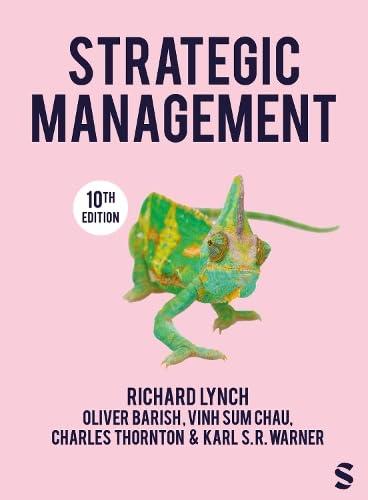Answered step by step
Verified Expert Solution
Question
1 Approved Answer
Return Fraud - A Growing Business Consumers love warranties, guarantees, and excellent return policies on the products they purchase. From the merchant s perspective, these
Return Fraud A Growing Business
Consumers love warranties, guarantees, and excellent return policies on the products they purchase. From the merchants perspective, these policies help to keep customers satisfied and coming back. But the problem merchants are facing more is the burgeoning business of return fraud. Return fraud typically occurs when consumers purchase a product, use it for some limited time, and then return it wanting their money back. One estimate is that return fraud is costing American businesses almost $ billion annually.
One type of return fraud occurs with merchants such as LL Bean or REI, Inc., when they offer lifetime warranties with the privilege of returning anything, anytime, for any reason. Recently, REI, the privately held sporting goods chain, has had to change its return policy because so many people took unreasonable advantage of it At one REI store, a customer returned a yearold backpack that he had used for mountain climbing because it was getting old and dirty, and the customer did not like it anymore. In another case, a woman returned a worn pair of sandals designed for hiking and wading in rivers because she had concluded they were not sexy enough.
Customers have returned clothing or shoes that have been torn, charred in a fire, or otherwise abused in extreme sports and have expected and gotten refunds. Some stores have gotten shredded clothing returned that was cut loose from customers when rescue workers had to cut through the fabric while saving them from a mishap. Though REI has concluded it must put restrictions on its returns policies, LL Bean, Patagonia, and Orvis have claimed they have no current plans to change their policies.
Another form of returns fraud also has been occurring, often in highend clothing stores such as Blooming dales, when women purchase fancy dresses, wear them
once to a wedding or party, and then return them, sometimes soiled with sweat and want their money back. Jewelry purchases are also being abused. The merchants call this practice wardrobing and are starting to take a firmer stand with respect to returns because of all the returns abuse they have been experiencing. In one recent year, percent of retailers reported they were victims of wardrobing.
Bloomingdales finally started a policy of placing a inch black tag in a highly visible place, such as on the hemline of dresses costing $ or more, as they are being purchased. Then, the customer can try the dress on at home without disturbing the tag and return it if it doesnt fit. Once the customer removes the tag to wear the dress in public, however, the garment cannot be returned. The company says it is using the btags to reinforce their policy that once garments have been worn, washed, damaged, used or altered, they cannot be returned.
Stores such as Victorias Secret and Bath & Body Works claim they are keeping returns data bases so they can detect patterns of returns abuse and be able to refuse future return privileges on serial returners.
How do excellent customers, ones who do not abuse return policies, regard what merchants are currently having to face today?
Is it unethical for customers to take advantage of returns policies or is this just the cost of doing business today? Is it unethical for companies to take the actions they are taking?
What is your appraisal of some of the actions companies must take with respect to their return policies? Are they justified? Is the consumer no longer always right?
Step by Step Solution
There are 3 Steps involved in it
Step: 1

Get Instant Access to Expert-Tailored Solutions
See step-by-step solutions with expert insights and AI powered tools for academic success
Step: 2

Step: 3

Ace Your Homework with AI
Get the answers you need in no time with our AI-driven, step-by-step assistance
Get Started


